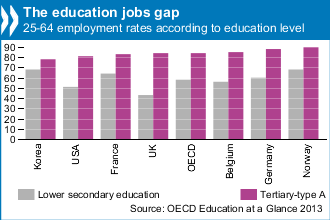Value of education rises in crisis but investment in this area is falling, says OECD
25/06/2013 - The jobs gap between well-educated young people and those who left school early has continued to widen during the crisis. A good education is the best insurance against a lack of work experience, according to the latest edition of the OECD’s annual Education at a Glance.
Unemployment rates are nearly three times higher among people without an upper secondary education (13% on average across OECD countries) than among those who have a tertiary education (5%). Between 2008 and 2011, the unemployment rate for the poorly-educated rose by around 4 percentage points, while it increased by only 1.5 percentage points for the highly educated.
 | “Leaving school with good qualifications is more essential than ever,” said OECD Secretary-General Angel Gurría. “Countries must focus efforts on helping young people, especially the less well-educated who are most at risk of being trapped in a low skills, low wage future. Priorities include reducing school dropout rates and investing in skills-oriented education that integrates the worlds of learning and work. Though the focus should remain on quality of spending, Governments must ensure that investment in education does not fall as a result of the crisis.” This year’s report finds new evidence of the value of vocational qualifications as a pathway to employment: countries with a higher than average (32%) share of vocational graduates, such as Austria, Germany, Luxembourg and Switzerland, saw unemployment rise much less or even fall among 25-34 year-olds than their peers with general upper secondary qualifications. |
The crisis has also widened the earnings gap: the average difference in earnings from employment between the low educated and the highly educated has risen from 75 percentage points across OECD countries in 2008 to 90 percentage points in 2011. On average, the relative earnings of tertiary-educated adults are over 1.5 times that of adults with upper secondary education. People with upper secondary education earn 25% more than their peers who left school early.
One outcome of the crisis has been a rise in the number of young people staying on at school, as their job prospects declined. Since 2008, the percentage of 15-29 year-olds who continued in education increased by an average of 1.5 percentage points among OECD countries.
But the crisis has halted the long-term trend of rising investment in education. Public spending on educational institutions between 2009 and 2010 as a percentage of GDP fell by 1% on average across the OECD area. Public expenditure on educational institutions decreased in one- third of countries during that period, by 2% or less in Austria, Ireland, New Zealand, Norway, Portugal, Spain and the United States. Drops of more than 2% were seen in Estonia, Hungary, Iceland, Italy and Russian Federation. Education budget cuts took place in 2011 and 2012 in 15 OECD countries. |
At the tertiary level, between 2005 and 2010, spending per tertiary student fell in 8 countries, as expenditure did not keep up with
Skills beyond School - the OECD review of postsecondary vocational education and training
Skills beyond School - the new OECD policy review of postsecondary vocational education and training, will look at the preparation of younger people and adults for technical and professional jobs. Key policy challenges include responsiveness to labour market needs, alongside inclusion, access, career guidance, finance, governance, teaching quality, integration with workplace learning, articulation with other sectors of education, and qualifications and assessment. It will build on the success of Learning for Jobs – which examined vocational education and training policy through 17 country reviews and a comparative report - and forms part of the horizontal OECD Skills Strategy linked to PIAAC and other initiatives across the OECD. It also draws on the OECD review of tertiary education.
- PowerPoint presentation: Skills beyond School - The OECD policy review of postsecondary vocational education and training
All OECD countries, including accession countries, are invited to participate. Countries may:
- Pursue an individual country policy review, involving the preparation of a background report by the country, followed by two visits by an OECD team, culminating in a report covering the strengths of the country system, including innovations and reforms of general interest and significance, analysis of the main policy challenges, and OECD recommendations designed to assist policy development. It will draw on experience from other countries to support the policy advice given. This option is designed to add substantial impetus and international perspective to policy development. Full country policy reviews are being conducted in Austria, Denmark, Egypt, Germany, Israel, Korea, the Netherlands, Switzerland, the United Kingdom (England), and the United States (with case studies of Florida, Maryland and Washington State).
- Prepare a background report and invite an OECD team for a short visit to provide a published commentary on the background report. This option is much more modest, and is designed to assist countries to understand their own country system better in international context. Abbreviated exercises leading to a short OECD country commentary will be undertaken in Belgium (Flanders), Canada, Iceland, Romania, Spain, Sweden and in Northern Ireland and Scotland in the United Kingdom.
Background reports will be prepared in all the above countries, and in France and Hungary. All the reports will be published on thecountry studies page as they become available.
Contacts
For further information and advice please contact the OECD team.


